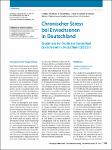Chronischer Stress bei Erwachsenen in Deutschland
Ergebnisse der Studie zur Gesundheit Erwachsener in Deutschland (DEGS1)
Hapke, Ulfert
Maske, Ulrike
Scheidt-Nave, Christa
Bode, Liv
Schlack, Robert
Busch, Markus
Die Studie zur Gesundheit Erwachsener in Deutschland (DEGS1) wurde von 2008 bis 2011 durchgeführt und umfasste Befragungen, Untersuchungen und Tests. Zielpopulation war die in Deutschland lebende Bevölkerung im Alter von 18 bis 79 Jahren. Insgesamt nahmen 8152 Personen teil. Chronischer Stress wurde erfasst, um seine Auswirkungen auf die Gesundheit und das psychische Wohlbefinden zu untersuchen. Zur Messung der Stressbelastung wurde die Screening-Skala des Trierer Inventars zum chronischen Stress der Altersgruppe bis einschließlich 64 Jahre zur Beantwortung vorgelegt (N=5850). Frauen geben mit 13,9% signifikant häufiger eine starke Stressbelastung an als Männer (8,2%). Die Prävalenz starker Stressbelastung nimmt mit steigendem sozioökonomischem Status ab; sie fällt von 17,3% bei niedrigem auf 7,6% bei hohem sozioökonomischem Status. Eine starke Belastung mit chronischem Stress ist besonders häufig (26,2%), wenn eine geringe soziale Unterstützung vorliegt. Menschen mit einer starken Belastung durch chronischen Stress zeigen deutlich häufiger eine depressive Symptomatik, ein Burnout-Syndrom oder Schlafstörungen als Menschen ohne starke Belastung durch chronischen Stress. Die Bedeutung von chronischem Stress als Gesundheitsrisiko wird durch die Daten bestätigt. Das Thema hat somit eine hohe Public-Health-Relevanz. The German Health Interview and Examination Survey for Adults (DEGS1) was conducted from 2008–2011 and comprised interviews, examinations and tests. The target population was the resident population of Germany aged 18–79 years. A total of 8,152 persons participated. Chronic stress was assessed to examine its effects on health and mental wellbeing. The Screening Scale of the Trier Inventory for the Assessment of Chronic Stress was used to assess stress burden among participants up to the age of 64 years (N=5,850). High levels of stress are significantly more often reported by women (13.9%) than by men (8.2%). The prevalence of high stress levels decreases with a higher socioeconomic status (SES); it falls from 17.3% with low SES to 7.6% with high SES. High chronic stress levels are particularly common (26.2%) in persons who report low levels of social support. Depressive symptoms, burnout syndrome and sleep disturbances are more common in people who have high levels of chronic stress than in those without high levels of stress. The results confirm the importance of chronic stress as a health risk and underline the public health relevance of chronic stress. An English full-text version of this article is available at SpringerLink as supplemental.
No license information

